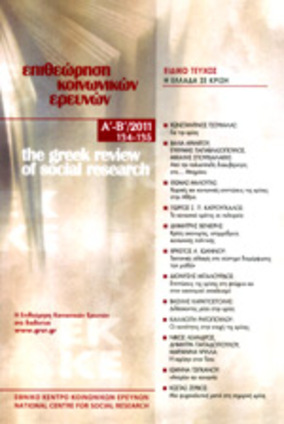Η αξιολόγηση των ΜΚΟ ως εργαλείο για τη χρηματοδότηση και τη λογοδοσία τους
Part of : Επιθεώρηση κοινωνικών ερευνών ; Vol.143, 2014, pages 55-83
Issue:
Pages:
55-83
Parallel Title:
The assessment of NGOs as a tool of funding and accountability
Section Title:
Articles
Abstract:
In recent decades the concept of evaluation and its practical applications gradually expanded from the business world in many human activities. For example, since the 1980s, terms such as efficiency, management by objectives and finally evaluation have found increased application within the public sector and especially in the field of development assistance. As frequent recipients / managers of development funds, NGOs around the world have gradually infused in their operations evaluation techniques either at project or at organization and / or industry level. This tendency has been reinforced by the emergence of new donors as well as the enhanced public interest on the sector. All these developments seem to lead to the gradual creation of tendency to enhance evaluation procedures within the sector.
Subject:
Subject (LC):
Keywords:
evaluation, evaluation culture, NGOs, effectiveness, impact, αξιολόγηση, ΜΚΟ, αποτελεσματικότητα, αντίκτυπος
Electronic Resources:
References (1):
- Μπουρίκος Δ., Σωτηρόπουλος Δ., 2014, «Οικονομική κρίση, κοινωνική πρόνοια και κοινωνία των πολιτών», Παρατηρητήριο για την Κρίση, ΕΛΙΑΜΕΠ, Μάρτιος. Σιούτη Β., 2010, «Το χρώμα του χρήματος», Ελευθεροτυπία, 8 Φεβρουαρίου, http:// www.enet.gr/?i=news.el.article&id=129838 Andrews E., Vitanov D., 2010, «Collecting expert opinion about high-impact nonprofits: review of philanthropedia’s methodology», Philanthropedia, 5, March. Arvidson M., 2009, «Impact and evaluation in the UK third sector: reviewing literature and exploring ideas», Working Paper 27, Third Sector Research Centre. Bachtler J., Michie R., 2007, «A new era in EU regional policy evaluation? The appraisal of the structural funds», Regional Studies, 29 (8), pp. 745-751. Bouret O., Lee S., McDonnell I., 2013, «Aid at a glance: Flows of official development assistance to and through civil society organisations in 2011», OECD, http://www.oecd.org/dac/ peer-reviews/Aid%20for%20CSOs%20Final%20for%20WEB.pdf Brown D., Moore M., 2001, «Accountability, strategy, and international non-governmental organizations», Working Paper 7, The Hauser Center for Nonprofit Organizations – Harvard University. Cannon C., 2013, «Evaluating non-governmental organizations – an overview of The Global Journal’s top 100 ngos methodology in 2013», The Global Journal, February. Charity Commission, 2004, Transparency and Accountability Report, http://www.charitycommission.gov.uk/media/95441/rs8text.pdf Daigneault P. M., Jacob S., Tremblay J., 2012, «Measuring stakeholder participation in evaluation: an empirical validation of the Participatory Evaluation Measurement Instrument (PEMI)», Evaluation Review, 36 (4), pp. 243-271. Davies R., 2001, «Monitoring and evaluating ngo achievements», in Desai V. and Potter R. (eds), The Companion to Development Studies, Routledge. Ebrahim A., 2003, «Accountability In Practice: Mechanisms for NGOs», World Development, 31 (5), pp. 813-829. Edwards M., Hulme D., 1998, «Too close for comfort? The impact of official aid on nongovernmental organizations», Current Issues in Comparative Education, 1 (1), pp. 961-973. ESADE, 2012, «Estudiosobre el presente y future delTercer sector social en un entorno de crisis», December, http://obrasocial.lacaixa.es/deployedfiles/obrasocial/Estaticos/pdf/Emprendimiento_Social/Informe_Tercer_Sector_social_es.pdf Fiennes C., Hoffman K., 2012, «Publicising the spend on “charitable activities” would be a disaster», Guardian Professional, 15 Νοεμβρίου, http://www.theguardian.com/voluntarysector-network/2012/nov/15/publicising-spend-charitable-activities-disaster Gaffey V., 2013, «A fresh look at the intervention logic of Structural Funds», Evaluation, 19, pp. 195-203. Garchitorena V., 2012, «Approaches to evaluating NGOs – some examples around the world», Alliance Magazine, 17 October. http://inspiringimpact.org/ http://www.aidtransparency.net/ http://www.bond.org.uk/ http://www.charitycommission.gov.uk/ http://www.charitynavigator.org/ http://www.givewell.org/ http://www.myphilanthropedia.org/ Ipsos Mori (on behalf of Charity Commission), 2012, Public Trust and Confidence Survey, http://www.ipsos-mori.com/DownloadPublication/1473_sri-charities-charity-commissionpublic-trust-and-confidence-june-2012.pdf Nelson J., 2007, «The operation of non-governmental organizations (ngos) in a world of corporate and other codes of conduct», Working Paper 34, Corporate Social Responsibility Initiative – Harvard University, http://www.hks.harvard.edu/m-rcbg/CSRI/publications/workingpaper_34_nelson.pdf Ní Ógáin E. et al., 2012, «Making impact - Impact measurement among charities and social enterprises», New Philanthropy Capital (NPC), October, http://www.thinknpc.org/publications/making-an-impact/ Nunnenkamp P., Ohler H., Schworer T., 2013, «US based NGOs in International Development: Financial and Economic Determinants of Survival», World Development, 46, pp. 45–65. Petropoulos S., 2013, «Evaluation of the European Structural Funds – a historical perspective», The Jean Monnet Papers on Political Economic, University of the Peloponnese, 4/2013, http://www.uop.gr/images/stories/monnet/petropoulos.pdf Ramachandran V., Walz J., 2012, «Haiti: where has all the money gone?», CGD Policy Paper 4, Washington, D.C.: Center for Global Development, http://www.cgdev.org/sites/default/ files/1426185_file_Ramachandran_Walz_haiti_FINAL_0.pdf Saxton J., 2012, «Do charities do enough to explain to the public how donations are spent?», Guardian Professional, 12 Οκτωβρίου, http://www.theguardian.com/voluntary-sectornetwork/2012/oct/12/charities-public-donations-spent Sen B., 1987, «Self-Evaluation: Issues of Concern», World Development, 15, Supplement, pp. 161-167. Stoianova V., 2012, «Private funding – an emerging trend in humanitarian donorship», Briefing Paper, Global Humanitarian Assistance, April, http://www.globalhumanitarianassistance. org/wp-content/uploads/2012/04/Private-funding-an-emerging-trend.pdf Summa H., Toulemonde J., 2002, «Evaluation in the European Union: addressing complexity and ambiguity», in Furubo J.E. et al. (eds), International Atlas of evaluation, New Jersey, Transaction Publishers. Toulemonde J., 1995, «The emergence of an evaluation profession in European countries: the case of structural policies», Knowledge and Policy: The International Journal of Knowledge and Utilization, 8 (3), pp. 43-54. Vachudova M. A., Spendzarova A., 2012, «The EU’s cooperation and verification mechanism: fighting corruption in Bulgaria and Romania after EU accession», Swedish Institute for European Policy Studies, European Policy Analysis 1, http://www.sieps.se/sites/default/ files/2012_1epa%20EN_A4.pdf Wallace T., 1997, «New development agendas: changes in UK NGO policies & procedures», Review of African Political Economy, 24 (71), pp. 35-55.




